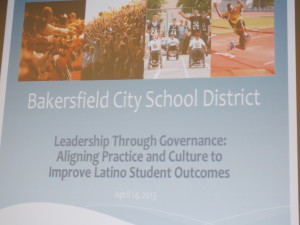I was disappointed with this presentation. It was more about input and process and absent any discussion about outcomes and raising student achievement:
One of the first tasks of Robert Arias did when he accepted the superintendency in Bakersfield, Calif., was to work with the school board to align the board’s values and goals with the work of the central office and the school improvement plans at each campus.
“Clarity precedes competence,” Arias told attendees at a Hispanic Caucus Breakout Session on Sunday at NSBA’s annual conference titled, “Leadership Through Governance: Aligning Practice and Culture to Improve Latino Student Outcomes.”
Aligning every stage of a school district’s efforts is necessary if school officials are going to be efficient and focused on improvement, he said. “Otherwise, you’ve got the board doing its thing, the superintendent doing his thing, and maybe what gets overlooked are the issues they need to work on.”
This alignment starts with the school board, Arias said. “They really must set the tone. It’s up to them to bring in the superintendent and sit down together and work it out.”
In Bakersfield, where Hispanics comprise 78 percent of student enrollment, “the board really was interested in aligning its efforts, he said. “Things weren’t happening as they should, and the problem was things weren’t aligned.”
The power of alignment can be seen in how the school system has dealt with the issue of student disciplinary issues, he said.
One of the four values articulated by the school board is equity, and in the process of setting specific district goals, one issue that came to the forefront was the disproportionate suspension rates of black students. This led the district to drill down into the data, which helped guide district and school strategies to tackle the issue.
The first step of administrators was to seek alternative strategies, including offering positive reinforcement for students, to deal with misbehavior—and that did help cut suspension rates by 46 percent in a single year. But a closer look at the data, Arias said, revealed that black students still were three times as likely to be suspended as white students.
But with the values and goals clear, he said, district and school administrators remain focused on the issue and this summer will be providing cultural proficiency training to help principals and teachers learn better techniques “to combat biases that impede student success.”
Another strategy, which also will boost student learning, was the creation of professional learning communities in each school, Arias said.
That focus also is key, he said. In a visit to China, Arias recalled, he looked out the window at a forest of construction cranes across the city and thought to himself, “These people are gearing up to take over the world.”
The latest international test scores underscored his concern, as China ranked near the top of such tests and the U.S. was far down the list.
“The point is, this is no longer somebody else’s problem” if minority students and students of poverty aren’t academically successful, he said. “We have to find the solutions … or we’re not going to keep pace.”

